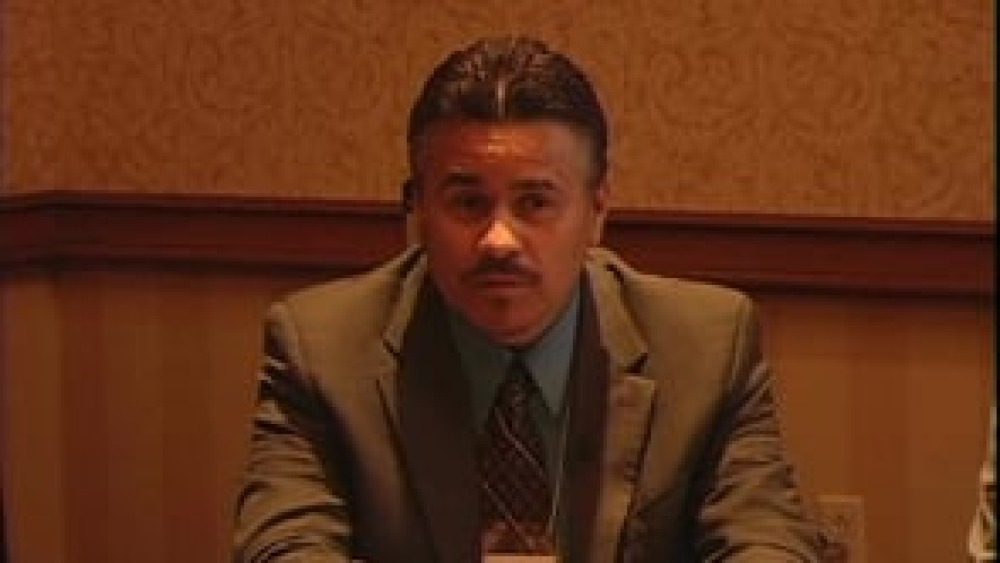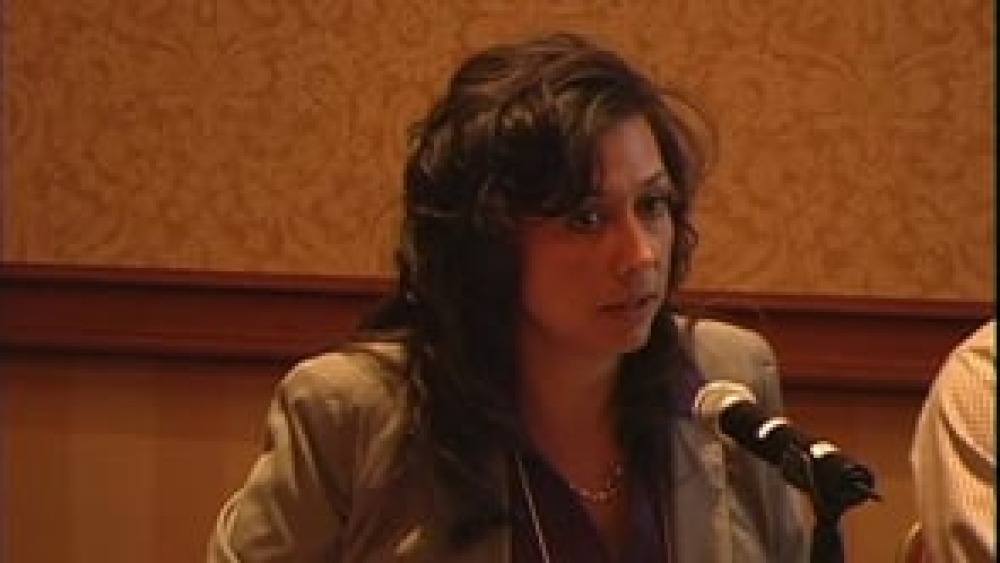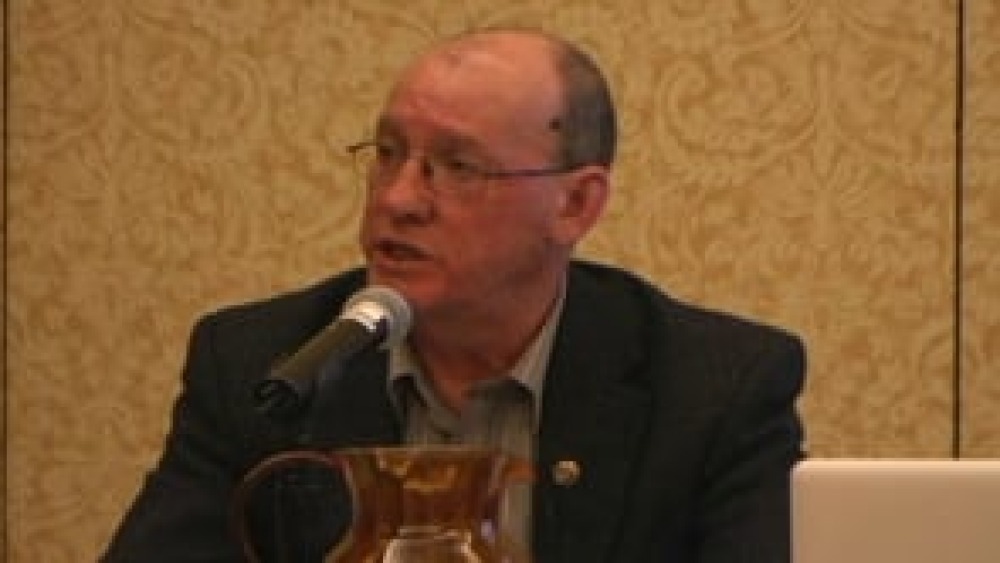Martin Harvier, Vice President of the Salt River Pima-Maricopa Indian Communty, and Monica Simeon, CEO and Principal Partner of Sister Sky, field questions from the audience about their roles in building sustainable economies for their respective nations.
Additional Information
Harvier, Martin and Monica Simeon. "Building Sustainable Economies: Approaches and Perspectives (Q&A)." Emerging Leaders seminar. Native Nations Institute for Leadership, Management, and Policy, University of Arizona. Tucson, Arizona. March 25, 2010. Presentation.
Transcript
Stephen Cornell:
"We've got a little more than 20 minutes so please, questions for Martin about what Salt River has done or anything else, questions for Monica about Sister Sky and their experience. The floor is open. Any questions?"
Audience member:
"Martin, you're 51 percent Native-owned and your policy on purchasing or acquiring stuff through Native partners, correct?"
Martin Harvier:
"Yes."
Audience member:
"How do you mitigate the price gouging or something around that area, because we had the same thing happen on our reservation?"
Martin Harvier:
"You know, that's kind of a concern right now. There are some...let's just take the paper like I said, somebody selling paper. There are some businesses that let's say they were in another area, but because of our policy and the preference that's given to community members, a lot of them will get into something that they weren't involved in because they know they have preference. It's been very difficult, but the tribe has had to look --especially with the economy, the downturn in the economy -- we still have to look out for the best interest of the community and there's been some that we've had to say, "˜You know what,' some of them are getting into it and they're actually the middle man. So they're purchasing the product and they're jacking the price up when the community can go directly to whoever is producing that product and get it cheaper. There's actually been a...the community has actually tried to put a price range that if they fall within that frame, they'll still use the community business, they'll still try to work with them. But we've actually had that, where some community members that are in a business, but they see an opportunity over here and they'll go into it and it actually kind of jacks the price up a little bit. But the community, as leaders we still have the fiduciary responsibility of our community, we've actually had to say, "˜We can't pay that much for this product.'
Audience member:
"Have there been instances where you had to go off reservation to non-Indian companies?"
Martin Harvier:
"Oh, yeah."
Audience member:
"I mean even though there is a company on the reservation. How do you get the community member who ventures off just to jack up the price? How do you get the community member to kind of finally realize to stay within the means?"
Martin Harvier:
"It all goes back to certification. When they get their certification that they're on the list of preferred vendors, to get on that list we already kind of know what price structure they're going to use. So if there's a product and they're on that list, I'm not sure, I forget how many we said we have on that list. We know we can go to them and get a good price, but what I'm saying is that there have been individuals that see that opportunity and they'll go out and they'll do that. They'll be the middle man for another individual. There also is a bidding process that goes in. I'm sorry. There is a bidding process that happens. We just don't take the one. If there's others that provide that product, there is a bidding process that goes through to get the best price."
Stephen Cornell:
"Other questions? Yes."
Audience member:
"I just want to applaud the courage that both of you have throughout because I can imagine...[unintelligible]. The question that I have centers around the two-pronged issue around how do you go about [unintelligible] and protecting your traditional knowledge so that competitors don't imitate your product. And then second, how do you go about ascertaining that knowledge within your community in a good way so that you draw the knowledge in your community [because] I can tell the community has grown in pride, in knowing that they know their medicines and herbs...[unintelligible]?"
Monica Simeon:
"That's a great question, thank you, and we've really struggled with that as we've grown. We started doing a lot of research on, if you're a company and you are marketing your product based on heritage, there is a lot you must be mindful of in terms of maintaining that honor and that authenticity but that respect. We took great pains to write missions and values, to always come back to that. If there were any way that we felt we would offend or be too specific with the plant tradition, then we weren't going to do it. That's critical. Now, one other way that we've been able to maintain and validate our authenticity is the Made by American Indians trademark. So it's a great product, it's a great fragrance, but it really is about a bigger social cause. When you buy a Made by American Indian product, you're supporting sustainability, job creation and economic diversification. So those are things that the consumer says, "˜Yeah, I want to be a positive part of that.' Aveda tried to launch a line called 'Indigenous' and this happened back in 2003, I believe. Aveda is a great international company, national company out of Minneapolis, very big, bought out by Estee Lauder but when they launched 'Indigenous,' consumers said, "˜How dare you? You are not Indigenous; you're not from a community. You're a big corporation. Don't do this.' And they had such an outcry that they actually pulled the line. So now I know how much they spent in product development, in marketing and everything else but they were sensitive to the outcry of the consumers. We've been in business since 1999 and we were always very afraid that somebody may say, "˜Uh, how dare you do this?,' but our Native communities really hold us up and say, "˜Good job.' But they say it because we're firmly founded in our values in what we want to do, in what we want to bring to market. Now to kind of piggyback off of what Martin has shared, I've had people come to me and say, "˜Could you sell these? Gosh, you have a great niche market.' Does it go back to promoting positive cultural sharing? "˜No, I'm sorry, I can't sell ash trays, I can't sell whatever it is, I'm not in construction. That's not what I do.' So I've seen that and I've experienced that, but when we build our businesses, our community-based businesses, build it on a solid foundation because you want to build a business that's not just going to be here but for my kids and my grandkids."
Stephen Cornell:
"Charlie, yeah?"
Audience member:
"I had a question and I think it's more for Martin, but I am overwhelmed in a way by the observation and appreciation for what you all are doing. As a non-Native, I think that the narratives that the Native community brings and shares with the non-Native community is really important and you are both creating inspiring and positive narratives, not only for your own communities but for the other, the non-Native communities. That's my observation. And I guess my question to Martin, I first heard about this on a story that ran on NPR nationally last October and I went online and I actually copied the transcripts for that in the link and sent it to non-Native participants in my communities so they would understand the power and the opportunity of working with tribes in area of economic development. I came a little bit late, so I'm not sure if you covered it, but could you talk a little bit more about your community's hosting and working with non-Native enterprises and business and in fact extending your tribal sovereignty and jurisdiction to non-Native businesses, which is kind of flipping the equation around? Can you talk a little bit more about that, unless you covered it before I came in?"
Martin Harvier:
"I don't think we really kind of touched on that. I think for the longest time, we call them people from the outside -- developers -- had a fear of developing on Indian Country, just the process that it goes through. A lot of them, the developers that come in and develop, if they develop off community the process is a lot quicker. You see an empty lot there, six months later you have a building. There's processes that you go through in Indian Country probably you all know. Our community has not only tribal land, but allotted land. So a lot of the land that we have is individually owned by community members, so there's a process it goes through. The area that I talked about, the corridor in our area where the development takes place, the tribe owns very little of that property. So when somebody comes in and they meet with a landowner or Devco, our development company, and talk about that property, they can talk to them but then they have to go talk to the individual landowners to see if that's something they even want to do on the community. The process is they work with our community staff but also after that's all done the Bureau of Indian Affairs still has to approve it. So there's a process, and a lot of times developers that come from the outside don't want to go through the process. We had a big kind of a fight with developers in our community. As you know, in a lot of Indian Country, infrastructure's not there. When you develop, if the infrastructure's there it has to be there so what we had to do, our infrastructure fees were so low we had to raise them. And it was a time when the economy was bad and the developers were coming and using the landowners against the council saying, "˜Hey, we'll go somewhere else,' threatening to leave in that area. Well, as a council we had to stand strong because that funding will help support that area as far as fire, police and the water. We had to do it to put the infrastructure there for the development to take place. They fought it but after it was all done and council improved the increase of impact fees, the complaining stopped and the development continued to happen. And sometimes tribes just have to stand strong because...they just have to because that stuff's just not there. But I think there's just a fear...example, even back to bank loans. There was a time when banks would not loan to Native Americans, especially like a mobile home. They would not take a mobile home on a trailer because if they didn't pay their bill, they didn't have the process of going out there and picking it up and a lot of that's been changed. The court systems have allowed them to come out and do that, so there's a lot of changes that happened in Indian Country that allow developers to come in and develop, the process. And I believe we have good staff. We have good staff that know the process and they're able to work with the Bureau, they're able to work with the landowners and get things done. And I think we've really enjoyed seeing the development that's happening in our community. It's getting a lot easier."
Stephen Cornell:
"I've got a question for Monica. It's clear that you've got a lot of support from your community and pride in the community and what you've done. Could you say a little bit about the degree of support or encouragement or even practical help that you've had from the tribal government and what role they've played either in your success, or if they've been obstacles you've had to overcome or how has that worked out?"
Monica Simeon:
"I think my tribal council and tribal government have been supportive in terms of bringing us in. And actually we got a $35,000 grant from them through a community economic development program or our tribe. The Spokane Tribe took a series of six entrepreneurs and gave us grant money. We had every aspect of business from start-ups to businesses like ours and I have to tell you, putting everybody in that kind of environment where we learned from one another and mentored one another, that was an incredible opportunity. And in that video you saw, we only had two piston fillers, we actually got another set through the tribe's grant program. So they continue to support us. We still continue to be kind of a rare thing, certainly in our community, and we found a lot of support nationally in Indian Country. So from other Native entrepreneurs to other tribal leaders, we found that support base. That's what I love about owning a company that caters to Indian Country is because we really do have that ability to become unified, to support one another, to share resources, Native business to Native business. So it's been...you have to get out there and you have to network and you have to meet the people, but once you invest in that time in building those relationships you do have a very strong network to pull from."
Stephen Cornell:
"My other question -- unless somebody's got a hand up -- was to Martin and that was financial literacy and whether the...I know some tribes have invested a good deal in financial literacy programs partly just for their own citizens to gain financial literacy but also as a support for entrepreneurs, because many of them have people who want to start a business but have very little experience with financial management, and I was just wondering if that's something that you all have done and what your experience has been with the need for or the delivery of financial literacy."
Martin Harvier:
"We touched on the Salt River Financial Institute, that's one of the enterprises that we turn to as far as educating our community members, our youth, on financing. We also have the Boys and Girls Club, which is good. They also give information to our youth as far as financing. Like I touched on, it's very important we feel as a council, as leadership, and again it goes back to we see it all the time when our children, our youth turn adult and they get their stipend of trust money. A lot of times they get it and it's gone and they're out there in the community, a lot of times they'll buy a car, which is an old car and the next thing you know it's broke down. They don't have a car. They'll loan it to friends. They don't know what to do. They get a bunch of money and they don't know how to use it. With the Institute, with the Boys and Girls Club, I think it's instilling in them, giving them ideas of what they can do. Again, I touched on the corridor, the construction that's going on, the opportunities that they'll have. We need to open up their minds. Even in the schools we've been telling them, we need to get them in the fields that when they get out of school they know where they can go to get an occupation. So we've been trying to educate again through the Institute, through the Boys and Girls Club to the school. Again, it's very important that our youth understand that the money that they get's not going to last forever, they need to invest it in a way that will help not only them but their children and their grandchildren."



